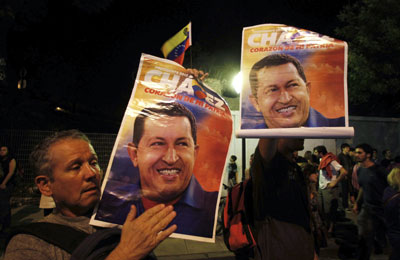
Venezuela oil industry ‘normal after Chavez death’
Caracas, March 6, 2013
Venezuela's oil industry was operating normally on Tuesday and no disruption was expected following the death of President Hugo Chavez, state oil company PDVSA said, calling for calm in the Opec nation.
The death of the socialist leader is unlikely to have a big impact on Venezuela's oil sector in the short term, with key projects expected to stay on track if his preferred successor wins elections due to be called in the next 30 days.
An opposition victory could eventually lead to an increase in foreign investment, but analysts said this could take years to filter through.
Venezuela is the world's 11th largest crude exporter, a top-four supplier to the United States and an increasingly important fuel source for China. In 2011, Opec said the nation had overtaken Saudi Arabia as the country with the world's biggest crude reserves.
In the post-Chavez era oil sales are expected to continue contributing more than 95 per cent of Venezuela's hard currency earnings.
State firm PDVSA said all its installations - including the Paraguana Refining Center, the second-largest in the world - were operating normally and domestic fuel supplies were guaranteed.
"The call for calm is aimed at clearing the climate of rumours and political destabilisation that enemies of the fatherland are trying to sow in the public opinion," PDVSA said in a statement, echoing government charges that the opposition has been seeking to destabilise the country.
The opposition denies the government's allegations.
Energy Minister Rafael Ramirez said the nation's oil workers would be faithful to Chavez's memory.
"The key to driving the oil industry is in the hands of the 100,000 valiant men and women who have shown their loyalty to Commander Chavez in everything we have been through," he said, referring to PDVSA's staff. "That situation will not change."
An extension of "Chavismo" under his heir apparent, Vice President Nicolas Maduro, would keep important existing projects on track in the Orinoco Belt region, while a change in parties could eventually attract more badly-needed foreign capital.
Key operations will likely continue much as they have done, with joint ventures with Chevron and Spain's Repsol in the Orinoco belt adding a small amount to current output of around 3 million barrels per day (bpd).
The government has been pushing its partners in the Orinoco and at its older fields elsewhere to come up with more funds to help turnaround stagnant production.
"My expectation is that we will see the status quo, with a transition to a similar style of government from Chavez's successor," said Katherine Spector, head of commodity strategy at CIBC World Markets in New York.
ORINOCO FLOW
The Orinoco projects are expected to eventually add 2 million bpd of new output via investments of more than $80 billion. But that will take years, with executives at joint ventures in the region saying work has often been delayed by lack of infrastructure and delays in payments from PDVSA.
"I don't expect any change in Venezuelan production in the near term," said Andrew Lipow, president of Houston-based Lipow Oil Associates.
Likely opposition candidate Henrique Capriles has said he would make some changes to the oil industry, ending some politically motivated oil deals signed during the Chavez years, streamlining PDVSA, which is widely seen as bloated and inefficient, and reviewing all of its joint ventures.
However, these would probably take years and Capriles is unlikely to want to tinker with the sector in the short term.
Neither he nor Maduro are expected to do much quickly about domestic fuel subsidies that have made Venezuela's gasoline the cheapest in the world: it costs less than $2 to fill up an average SUV.
Government and opposition leaders recognise the losses made on those generous subsidies are too big.
But officials will be wary of increasing prices during a sensitive transition period - given their memories of deadly 1989 riots that were triggered in part by a fuel price hike. – Reuters







